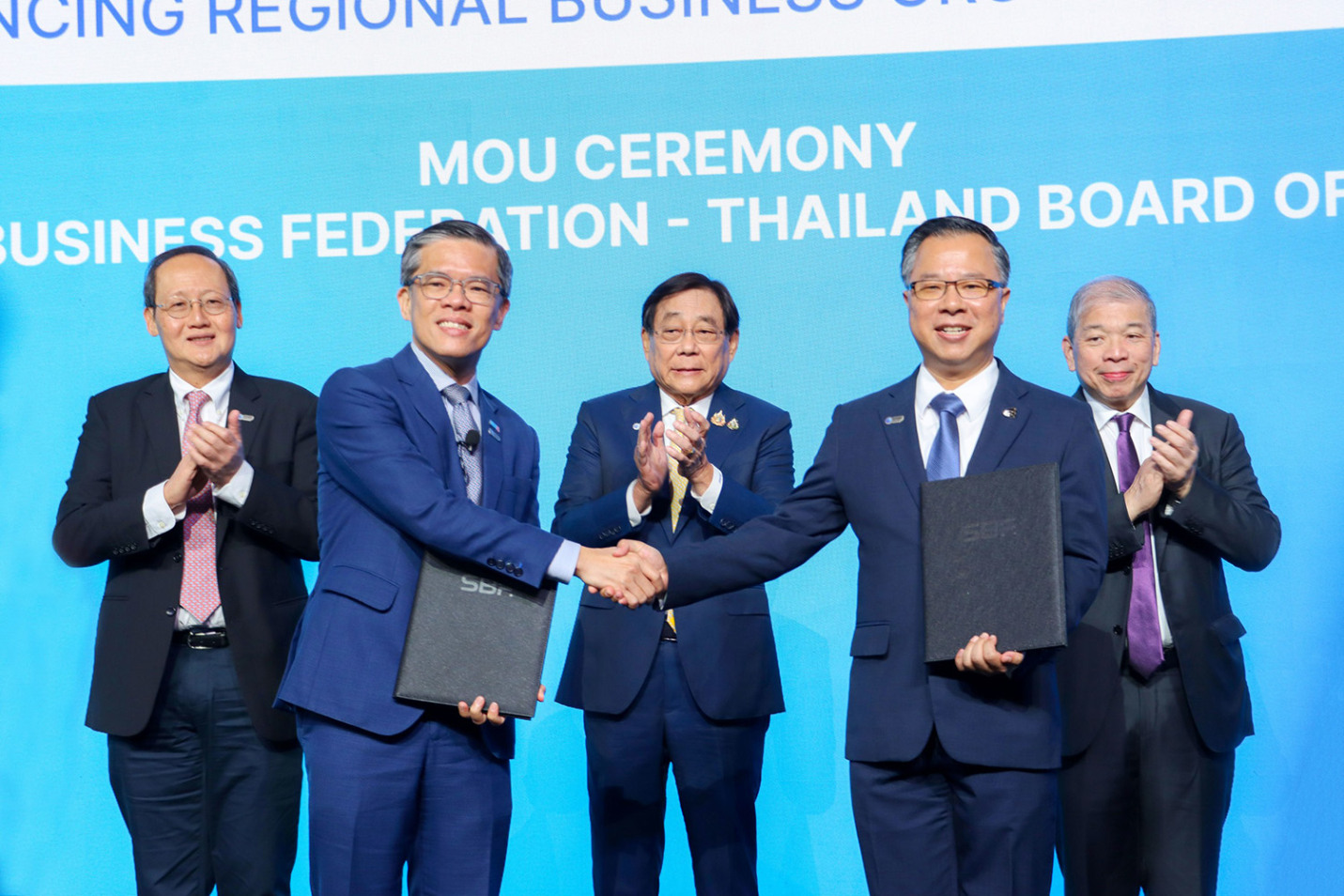
Two hundred Singaporean business leaders participated today in Bangkok in the 9th edition of the Singapore Regional Business Forum, making this event the largest gathering to date in Thailand of the Singapore Business Federation (SBF), Mr. Narit Therdsteerasukdi, Secretary General of the Thailand Board of Investment (BOI), told reporters.
The event, which was held as the two countries are celebrating this year 60 years of diplomatic relations, was attended by a total of more than 450 participants, representing 250 companies and 25 countries.
On the side of the event, the SBF and the BOI signed a Memorandum of Understanding (MoU) aimed at further strengthening economic cooperation between the two countries and at "attracting and supporting enterprises from Singapore to pursue investment opportunities in Thailand.” The MoU covers key sectors such as agriculture and food processing, biotechnology, semiconductor, advanced electronics and electrical appliances, medical, petrochemicals and chemicals. The BOI and SBF also agreed to exchange information about investment trends and policies, promising areas of mutual cooperation, and projects requiring foreign investment.
The Forum, held at The Ritz-Carlton in the Thai capital, was organized with the support of the BOI and of leading companies from both countries, including Thailand’s Bangkok Bank, and Singapore’s United Overseas Bank.
Thailand’s Deputy Prime Minister and Minister of Finance, Mr. Pichai Chunhavajira, noted in his keynote speech at the opening of the forum that Singapore topped the rankings for foreign direct investment (FDI) in Thailand both last year and in the first half of this year, mainly due to investments in data centers and electronics. In 2024, the BOI recorded its highest number of investment applications over the past decade, with over 3,100 projects totaling more than USD 33 billion, a 35% increase compared to 2023. Total investment applications in the first half exceeded USD 32 billion, representing a 1.4 fold increase from the year earlier period.
"The relationship between our two nations is deep, diverse, and growing ever stronger, and FDI from Singapore are playing an important role in shaping Thailand’s dynamic investment landscape” said Mr. Pichai. "Looking ahead, there is immense potential for further cooperation between Thailand and Singapore, particularly in the area of renewable energy and the digital economy. Thailand is richly endowed with green energy resources, and given the geographical proximity between our two nations, Singaporean investment in this sector can be seamlessly integrated.”
Mr. Pichai also noted the two countries collaboration in digital infrastructure is a cornerstone for advancing economic connectivity in the AI era, and the fact that both countries are partners in regional frameworks such as the ASEAN Free Trade Area (AFTA) and the Regional Comprehensive Economic Partnership (RCEP) is helping to reinforce bilateral cooperation.
"I am heartened to see such strong participation by companies from Singapore, Thailand, and the wider region, united by a common goal: to strengthen business resilience and seize new opportunities,” Dr. Tan See Leng, Singapore’s Minister for Manpower and Minister-in-charge of Energy and Science & Technology in the Ministry of Trade and Industry, said in his own keynote speech. "By working together, Singapore and Thailand, along with the rest of ASEAN, can turn the challenges into opportunities. We can build a more integrated and resilient regional economy enabled by digital and green transformation, as we continue to define and shape our collective future.”
Discussions during the forum included a panel about the urgent need for regional partnerships and cooperation in the field of innovation to build resilience in the face of rising economic uncertainty, shifting supply chains, and increasing protectionism around the world. Another panel discussed the imperative to align development with sustainability through the use of green financing, renewable energy, and sustainable practices, not only to address climate challenges but also to unlock growth. Future-proofing businesses through innovation, digitalisation, and regional collaboration was also discussed as necessary in the era of escalating geopolitical tensions and global economic uncertainty.
Mr. Narit in his closing presentation described for the audience Thailand's business and investment landscape, and the country’s positioning as a hub for innovation, advanced manufacturing, and sustainable industries. He also detailed the Government’s economic priorities, the country’s strong value chain in various sectors, the large array of investment opportunities available to investors from Singapore and other countries, as well as the attractive investment incentives offered by the BOI.
Mr. Narit also emphasized Thailand’s commitment to developing renewable energy. Under the revised Power Development Plan (PDP), Thailand is targeting 51% clean energy in the national power mix by 2037. Mechanisms introduced to support the transition include the Utility Green Tariff (UGT), which offers two options. UGT1, which provides electricity bundled with Renewable Energy Certificates, has already received more than 40 applications since it was launched earlier this year. UGT2, offering premium features such as traceability, will be available from September 2025.
The government is also currently developing the Direct Power Purchase Agreement (Direct PPA), which will be allowing power users to contract with clean energy producers directly through the Third Party Access (TPA). The initial phase will allocate 2,000 MW, especially for data center service providers. If successful, this mechanism will be extended to other strategic industries.
